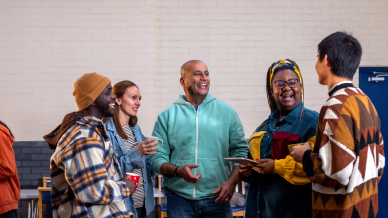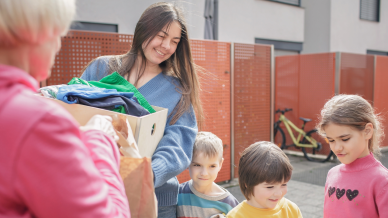What comes to mind when you are asked to think of “home”? Enjoying your favourite meal at the dinner table. The smell of your duvet as you fall asleep. The voices of your loved ones or pets as you step through the door. Curling up on the sofa to watch your current TV obsession, ready to chat about it with your friends and family the next day.
Home is where most people will say makes them feel safe and relaxed and unleashes their true selves; no matter how silly your dancing in the kitchen might be!
Imagine for a moment that someone takes all that away from you. You are escaping danger with only what you left the house with today or a few things you can carry. You might not know where you are going or where your loved ones are.
Although everyone's experiences are unique, we can all agree that feeling stressed, anxious, and lost is unpleasant. These are just some of the shared feelings of refugees who arrive in the UK to start a new life.
Who is a refugee?
Refugees are people forced to leave their homes and cross an international border for safety. They may be escaping from war, violence, or persecution, and international law protects them.
The UN Refugee Agency estimates that there are more than 35 million refugees (about twice the population of New York) worldwide, with 41% of those being children.
Refugees are separate from migrants. Migrants have freely come to the UK to start a new life and generally do not face risks to their lives or freedoms.
What do refugees bring to our community?
Did you know about 2000 NHS doctors or medical staff are refugees? That includes those from Ukraine, Afghanistan, Myanmar and more.
There’s a misconception that refugees are a financial drain to the community. While everyone needs some support to get back up on their feet, most refugees bring knowledge, skills and training. That includes highly skilled professions like medicine, law or education.
Working is one of many ways which help refugees regain a sense of purpose and give back to the community that welcomes them. They can fill in gaps in the workplace and bring a new perspective to solve problems which may not have been possible otherwise.
Having more diversity in the community also introduces new culture, arts and entertainment! Many Syrian refugees have opened restaurants across the UK. You may find new favourite foods, unique flavour pairings, or creative ways to add vegetables to your meals.
Learning about different cultures can help you understand movies better and discover more stories that interest you. You can find new music or new words to express yourself. We really like the word "habibti," which means "my love" or "darling" in Arabic.
Having a diverse community is beneficial because it allows you to see things from different perspectives. It also helps you learn about different ways of life. It can help you stay informed about global events.
Overall, it helps our community and children to learn more about inclusivity, compassion and being kind to others.

What you can do to support refugees
Here are some practical ways you can support refugees as they settle into your community.
Volunteer your time
Organisations like the British Red Cross, Refugee Action, Care4Calais, and local community groups are always looking for volunteers. Your time and effort can make a big difference by helping with language classes, providing transportation, or offering companionship.
If you’ve never volunteered before, or want to refresh your safeguarding knowledge, we run courses for volunteering skills.
Help with communicating in English
New arrivals to the UK are called asylum seekers until they are given refugee status. Before they are given refugee status, they cannot work or access public services like healthcare and legal assistance.
If you speak a language other than English, you can assist during the application process. You can also help in situations that require a higher level of English proficiency. Consider joining our Community Interpreting courses to get more confidence in translating, whether it’s to volunteer or in a paid role.
Donate goods and services
Are your kitchen cupboards overflowing with spare pots and pans? Got a box of baby clothes you need to donate? Have a bike that you bought with intentions to get fit but never used? Find a new home for your items as well as help someone else build a new home.
Even if you don’t have any items to spare, you may be able to offer a service. Medical care and legal advice are some of the vital services refugees need.
We have courses to help you gain qualifications in stress awareness, mental health, and counselling for those interested in offering wellbeing support. These are part of our Health and Social Care courses.
Offer a warm welcome
Simple acts of kindness, such as inviting refugees to community events, helping them navigate public transport, or showing them around the neighbourhood, can help them feel more at home. A friendly smile and a willingness to assist can ease the transition significantly.
Everyday things which you think are common knowledge, might not be so obvious to someone who’s just arrived. Can you point someone to the right websites, agencies or groups?
- Work in a school or recently applied for a school place for your child? Getting a school place and bringing up children is one of the biggest challenges faced by refugees. Tell them about the steps they need to take.
- Know the local area like the back of your hand? Securing a safe and stable place to live is a top priority. Help by pointing out a reputable estate agency.
- Most refugees will want to find a job. Can you help someone find job seeker websites and tell them how recruitment works?
- Refugees may encounter cultural differences and obstacles. Having a friendly person to answer questions without judgment can help newcomers feel comfortable and settled in their new environment.

Support local initiatives
Many towns and cities have initiatives aimed at integrating refugees into the community. Supporting these programs through donations or by attending events can help sustain their efforts. Look for cultural exchange programs, community dinners, or sports activities that foster inclusivity.
If they are looking for English classes, point them to a local English for Speakers of Other Languages (ESOL) course.
Educate yourself and others
Understanding the challenges refugees face can make you a more effective advocate. Attend talks, read books, and engage with resources that offer insights into their experiences. Sharing this knowledge with your network can foster a more welcoming and informed community.
Refugee Week’s website has a get list of books and podcasts for all ages to learn about the experiences of displacement and rebuilding a home as well as short films.
By taking these steps, you can help refugees not only survive but thrive in their new home. You will also benefit from meeting new people! Your support can transform lives and build a stronger, more inclusive community for everyone.
What to learn more? Read Oksana's story, a remarkable woman who joined a WEA course in 2023 after moving from Ukraine to integrate into her local community.




